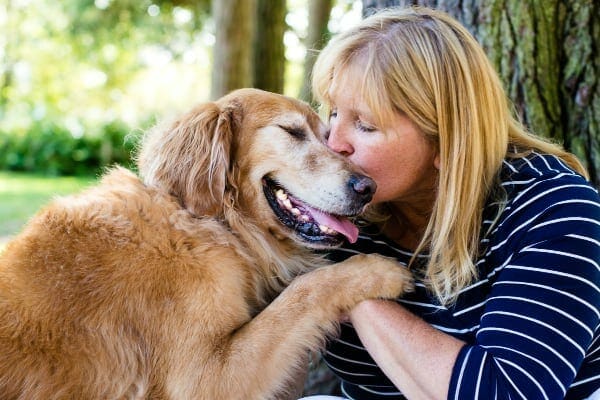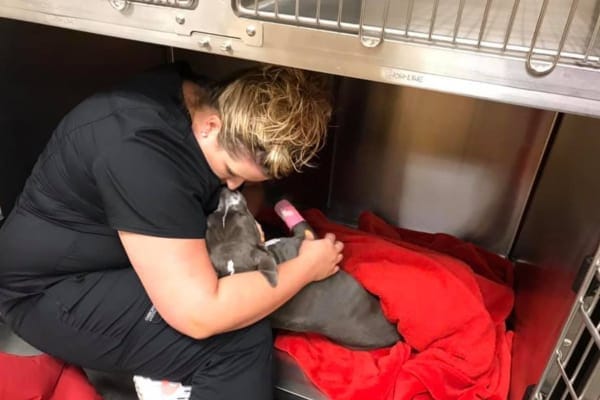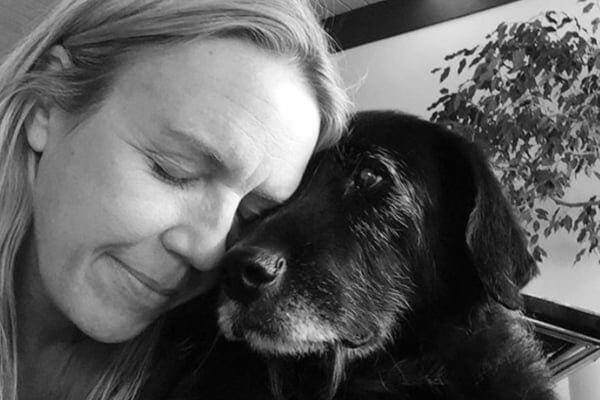
As your dog ages, you may have feelings of inadequacy as a pet parent. Dr. Julie Buzby, integrative veterinarian and founder of Dr. Buzby’s ToeGrips®, asks you to give yourself some grace. Through her six tips, she offers specific ways that you can continue to be your dog’s biggest hero.
Caring for a senior dog can be hard.
Mentally, physically, financially, emotionally…it can be hard.
Even your closest friends and family probably don’t appreciate the sacrifices you make day after day to give your faithful friend the love, support, and care he needs.
As you and your dog ride the roller coaster of good days and bad days, it may be tempting to feel like you’re doing something wrong — that despite your best intentions, you’re somehow failing your dog.
In my twenty years of practice, I don’t remember a client ever actually saying, “I feel like a failure.” But I’ve talked with many dog owners who confess (sometimes through tears) to feeling like they’re not doing enough to quell their dog’s pain, suffering, or decline. They sometimes think, “My dog’s failing so I must be failing.”
As our dogs age, life has a way of writing its own story for us — one that is entirely out of our control. However, I’m willing to bet that—just by being by your dog’s side—you are your dog’s biggest hero.
So as time marches on and your dog’s muzzle gets greyer, please never for one moment think you’re failing as a pet parent. On the contrary, you are your dog’s companion, waitress, nurse, playmate, nail technician, personal trainer, and social media manager. As if you weren’t already, here are six specific ways you can be your dog’s hero.
6 ways to be your senior dog’s hero
1. Research and ask lots of questions.
Just like many of my veterinary clients, Jack was panicking. His dog had just been diagnosed with a tumor, and he was desperate for information.
Thanks to modern technology, I found myself being interviewed by Jack on his radio show, answering his close-to-home questions about what he and his dog could expect in the weeks to come.
He half-heartedly joked that since his dog’s diagnosis, he’d been up all hours of the night searching for information from Dr. Google. But instead of calming his fears, his late-night searches had worked him into a frenzy.
This is far too common.
A word of caution about online searches: Without specific information from a qualified veterinarian, general searches—grasping for a diagnosis—will usually yield more angst and fear than help. However, once you’ve had an in-office exam and received a diagnosis, reading information online can be incredibly helpful and reassuring. It’s one of the reasons I write this blog!

In fact, I believe the primary goal of online searches is not for pet owners to jump to their own conclusions about their pet’s health but to come up with questions to ask their vet that will inform their decision-making process.
When you’re concerned about your pet’s health, your first stop should always be your veterinarian. Then and only then, jump online, learn from trusted experts, and continue asking questions about your dog’s care.
2. Save for a worst-case scenario.
This is a hard topic to broach during times of financial uncertainty, but perhaps now more than ever, it’s worth saying: Vet care can get suddenly and unexpectedly very expensive.
Just consider these scenarios:
- Your dog was perfectly healthy yesterday, but today stumbled while running in the yard and now needs a $3,000 surgery for a torn cruciate ligament.
- Your senior dog awkwardly jumped off the bed this morning and suddenly needs a $5,000 surgery for a ruptured disc in his back.
- Your kids accidentally left the gate open. Your puppy was hit by a car and needs critical care to save his young life.
You may not know what life holds for you and your pet in the days to come, but you can avoid not having sufficient finances to care for your dog through pet insurance or a simple savings account.

I recently saw a 19-year-old dog for a second-opinion consult because she had not been eating well. I took one look at the dog’s mouth and knew what was going on, “This poor dog’s mouth is so painful. No wonder she’s not eating,” I blurted out in amazement.
The solution for this dog was going to be expensive. I referred the owner to a board-certified veterinary dentist who worked in a facility with a board-certified veterinary anesthesiologist so the dog would get the best of care for both the oral surgery and the tricky anesthesia for senior dogs.
Thankfully, the owner had regularly set aside money for her dog’s medical emergencies and was happy to agree to the procedure — even though it was pricey—because it offered hope for a much better quality of life (and appetite!) for whatever time her beloved dog had left.
3. Embrace the veterinary-client-patient relationship.
One of the best ways to be your dog’s hero is to have a close relationship with your vet.
This means you know your vet, and your vet knows you (and, of course, your dog!). The value of this relationship cannot be overstated as your canine companion moves through the five important milestones of your dog’s life journey.
Occasionally, someone will write to me and describe a less-than-trusting relationship with their vet. It shouldn’t be that way.
Your vet should feel like an extended part of your dog’s family. You should believe, without a doubt, your vet has your best interest and your dog’s best interest at heart. If you do, you will trust his or her plan for your dog’s health and wellness. If you don’t have that kind of relationship, please, look for another vet.

As a veterinarian, I want my clients to feel good about our veterinary-client-patient relationship and to rest in that partnership. Trust really is at the core of practicing medicine. For more on the importance of the veterinary-client-patient relationship (VCPR), especially in our COVID-evolving world, read my recent blog on veterinary telemedicine.
4. Expand your dog’s healthcare team.
I recently needed oral surgery on my sensitive gum tissue.
I drove five hours to have it done because my dentist mentioned, “There are some local guys who do this, but they’ve all been taught by a doctor in Atlanta. He’s the leading expert in the world on this surgery.”
“Great,” I said. “Please give me a referral. I’ll go to Atlanta.” My dentist looked at me like I had two heads. For me, it was a no brainer. I want the guy who’s done the surgery so many times he could do it in his sleep.
The same is true for veterinary care. While your dog’s primary veterinarian is your greatest ally, there are times when seeing a specialist is the best course of action. A specialist, by very definition, concentrates on a specific discipline within veterinary medicine.
I’m suprised by the number of my clients who just want to keep it local now, but I always recommend Be willing to see a board-certified specialist for a second opinion, a tricky diagnosis, or orthopedic surgery.
Talk openly with your veterinarian about other qualified professionals who could be valuable members of your dog’s healthcare team. While it may not always be possible based on your location, your dog’s ability to travel, and your finances, seeing a specialist and expanding your dog’s healthcare team may provide the “win” you’re looking for.
5. Plan for when you’re gone.
In 2012, when we decided to launch our company, Dr. Buzby’s ToeGrips®, I was scared. There was a huge financial risk in taking an idea and bringing it to the marketplace. I’m a veterinarian, for Pete’s sake, what did I know about starting a company?
One of my dear clients, Beth, was a huge supporter of my dream — so much so that she often offered to fund my venture. I turned her down several times, but she wouldn’t take no for an answer and she had the resources to do as she pleased.
I came home from church one day, and there was a shopping bag hanging on my doorknob. I grabbed the bag, peeked inside, and burst out laughing. The bag contained $10,000 in cash—in $20 bills. I knew it was from Beth.
A few years later, Beth passed away unexpectedly. But even as well-off as Beth was, she had made no plans or provisions for what would happen to her two dogs. At one point, her family actually talked of taking one to the shelter and euthanizing the other. Unwilling to let that happen, several of her friends and I conferred and a happy private adoption was arranged.
To avoid a similar situation with your pet, talk to your loved ones and your lawyer to make sure your dog will be provided for if life throws you a curveball.
6. Be proactive and take precautions.
Another way you can care for your dog to the end is by proactively keeping them safe. You can do this in many ways.
- Crate train from the beginning. It’s vital that your dog knows how to be content in a crate. It matters at home, for travel, and if they are ever hospitalized at the vet’s office. It’s a really important “life skill” for a dog.
- Keep toxins out of reach. When we adopted our second dog, Zeke, he was a five-month-old puppy, full of mischief. One Sunday afternoon, I set a bowl of grapes on my daughter’s nightstand next to her bed, and it never occurred to me that the purple fruit would be a doggy temptation. Luke, our first dog, would never have touched them in a thousand years, so I’d grown lax. Well, Zeke got into the bowl of grapes and ate every last one. Grapes, as you probably know, can be highly toxic and extremely dangerous for dogs.
- Put a seatbelt on your dog when traveling. I have a client who just purchased an RV. She’s such a hoot — traveling around in this monster-sized vehicle with her little six-pound Maltese. The client had this to say about her safety set up: “Eleanor is always safely secured when traveling in a vehicle. If pets are not secured, they become a projectile during sudden stops or accidents! This is Eleanor in our RV. Her car seat and the tether that hooks onto her travel harness locks securely into the RV’s seat belt and shoulder strap. This seat design sits her up so she can see out while also providing “walls” that surround and protect her. Fortunately, the combined weight of Eleanor and her car seat do not activate the airbag. That means she can safely ride shotgun in our RV.”

Our dogs are innocent, sweet creatures who often follow their nose, curiosity, and instincts straight into trouble. Stay informed about hazards, perils, and poisons you need to keep away from your dog:
- 10 Garden Plants That Are Dangerous To Dogs [With Pictures]
- Can Dogs Eat Chocolate? Dr. Buzby Shares Banjo’s True Story And What To Do If Your Dog Eats Chocolate
- Xylitol And Dogs: Why Your Dog’s Counting On You To Read This
- 10 Holiday Dangers For Dogs: Why Christmas + Canines = Caution
- 9 Classic Thanksgiving Foods Dangerous To Dogs
Complete peace of mind

Over the course of your dog’s life, you’ll come to think of your beloved dog as your hero — your faithful and loyal companion who is there for you in sickness and health, for better or for worse.
But I’m willing to bet, you’re also your dog’s hero— making quiet sacrifices, providing loving care through the day and the night, and never giving up.
And when the day comes for you to say your final goodbye, there’s no doubt you’ll have tears of sadness and grief.
But remember to stroke that sweet face with complete peace of mind that you’ve been your dog’s hero — right to the very end.


Thank you so much for this article. Yes, it is difficult caring for a senior dog, particularly when they have mulitple health issues. I find myself wondering if I am doing the right thing by my sweet girl. But everytime she smiles at me or comes running to me as fast as those arthritic legs can move her, I know everything has been worthwhile. Some people don’t understand the love I have for her and it is nice to know there are other people out there like me who would do anything in their power to make their pup happy.
You are welcome, Jenny! I know you are doing an outstanding job! Keep up the great work!